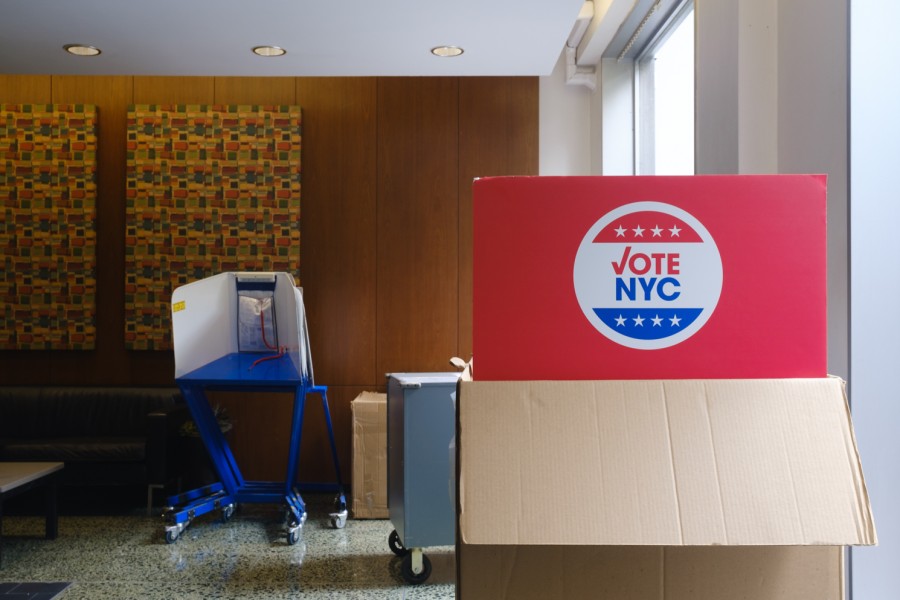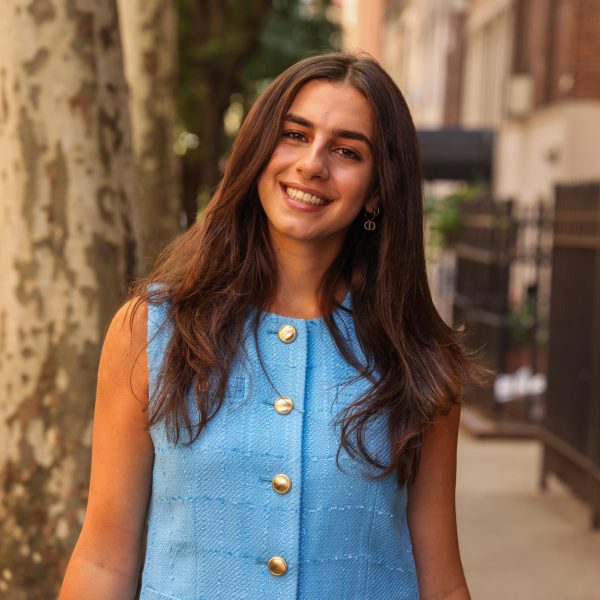Nearly half of eligible NYU students won’t vote in midterms, WSN poll finds
Despite the efforts of the NYU Votes campaign to increase student voter turnout, many students who are eligible to vote have chosen not to cast their ballots in the midterm elections on Tuesday, Nov. 8.
File photo: A polling site located at 2 Washington Square Village. (Samson Tu for WSN)
November 8, 2022
NYU senior Jazmine Ulloa is one of many students who has decided to not vote in this year’s midterm elections on Tuesday, Nov. 8. WSN talked to 103 students who are eligible to vote about whether they planned on casting their ballots in the midterm elections — 27.2% said they had already voted, 26.2% were preparing to and 46.6% did not plan to at all.
“I’m just not into politics,” Ulloa said. “I’m not really aware of anything that’s going on. I’m not aware of who’s running.”
In previous midterm elections, NYU has seen low voter turnout campuswide. In 2018, university administrators, faculty members and students created NYU Votes, a campaign that encourages students to cast their ballots by emphasizing the importance of each vote through events and university communications.
The voting rate among NYU’s student body has increased over the last several years, rising from 9% in 2014 to 37% in 2018. Jason Hollander, the co-director of NYU Votes, said that the campaign’s goal this year was to motivate even more students to cast their ballots.
“What a lot of people don’t know is that the results of the midterm elections and issues at stake will impact their lives more than a presidential election,” Hollander said. “I’m hoping that this year, we see the 37% move further up.”
Among students who have voted or plan to vote, many named issues such as climate change, women’s rights, cost of living and racial equity as their motivation to head to the polls. Gallatin first-year Emma Schwartz voted for the first time in Utah, where the Republican Party controls the offices of governor, attorney general and the state legislature.
Utah’s Senate election is among many close races that will determine the political future of the United States. The Republican incumbent currently polls only seven points above his opponent. Analysts have predicted a nationwide “red wave,” in which Republicans may sweep several key elections — even in Democratic strongholds.
In New York’s race for governor, Republican nominee Lee Zeldin threatens to unseat Democratic incumbent Kathy Hochul. Zeldin voted to overturn the 2020 presidential election, and has backed policies championed by former President Donald Trump.
CAS sophomore Sydney Barkley said she is concerned about the future of reproductive rights in her home state of New Mexico, given the narrow race between the current governor, Democrat Michelle Lujan Grisham, and opponent Mark Ronchetti.
“New Mexico has always been super blue, so it would be absolutely insane if that was taken away,” Barkley said. “It’s a little too close right now for comfort.”
Barkley, however, chose to vote in New York because she said it was easier than requesting and submitting an absentee ballot.
CAS first-year Edgar Gracia, another resident of New Mexico, also noted how the state made it difficult to vote by mail. Under state law, Gracia would need a New Mexico license or ID, which he said he struggled to get from home while at college. He said the confusing and overlapping laws were overwhelming and prevented him from voting at all.
“People try to tell me to vote,” Gracia said. “I don’t have a license from my home state, and I’m not sure how mail-in ballots work. And I don’t know if I can vote in New York.”
Some students who already voted are still pessimistic that their vote will not have an impact on the outcome of the races in their home states. Schwartz said she hopes to see more progress toward securing the rights of women, LGBTQ+ individuals and people of color in Utah. She specifically mentioned Dobbs v. Jackson — a Supreme Court decision that overturned the federal right to an abortion this past June — as cause for concern.
“Being a young woman in a state like that is really scary, especially with Dobbs just being overturned,” Schwartz said. “I’m just trying everything to vote and hopefully make a change.”
Contact Adrianna Nehme at [email protected].

























































































































































